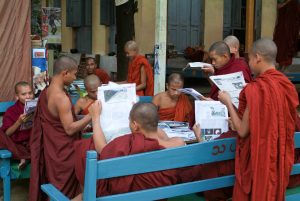Journalists from the Philippines and Myanmar have been nominated for the Reporters Without Borders (RSF)’s annual award, the watchdog group said in a statement yesterday.
Fifteen journalists and media outlets have been shortlisted for the 30th iteration of the Press Freedom Prize, which will be awarded in a ceremony in Paris on December 12. They are grouped into three categories, recognizing journalistic courage, impact, and independence.
Among the nominees was the imprisoned Myanmar journalist Han Thar Nyein. The co-founder of Kamayut Media, Han Thar Nyein’s travails encapsulate the nadir into which the country’s press has slipped since the coup of February 2021. He was among the first media workers arrested by the country’s military after it seized power, and has been imprisoned since in Yangon’s Insein Prison, where, according to RSF, he has been “subjected to extreme violence and torture, burns all over his body, rape threats, and death threats.”
Han Thar Nyein was nominated for RSF’s Prize for Courage, which is “awarded to journalists, media, or NGOs who demonstrate courage in the practice, defense or promotion of journalism in a hostile environment and despite threats to their freedom or safety.” He was nominated alongside journalists from Iran, Yemen, China, and Nicaragua, which unsurprisingly sit in the bottom reaches of RSF’s Press Freedom Index for 2022. Myanmar itself came in at 176th place out of the 180 nations on the index.
Also nominated for RSF’s Prize for Independence, which is “awarded to journalists, media or NGOs for resisting pressure (including financial, political, economic, or religious pressure) or because of the values and rules that enable them to resist,” was Lady Ann Salem of the Philippines.
As well as being the editor of the news site Manila Today, Salem also helps coordinate People’s Alternative Media Network, or Altermidya, founded in 2014, which describes itself as “a network of independent and progressive media outfits, institutions, and individuals” focused on field reporting and investigations, especially involving marginalized rural communities.
Like Han Thar Nyein, Salem has been targeted by the authorities for her work. Under former Philippine President Rodrigo Duterte, she was subjected to “red-tagging” and was jailed in December 2020 on terrorism and “leftism” charges after police planted guns in her Manila home. Salem was released in March 2021 after a court ruled that her arrest was “null and void.”
“Red-tagging” is a practice by which dissenting individuals or groups are “outed” to the authorities as legitimate targets for arbitrary arrest or, in the worst cases, summary execution. The tactic became increasingly common under Duterte, who engaged in a rolling struggle with the adversarial Manila press corps, linked in large part to critical coverage of the extrajudicial killings that made up his bloody “war on drugs” campaign.
According to RSF, Salem “embodies journalism’s future in the Philippines, a new generation of journalists following the trail blazed by Maria Ressa.” For the investigations that she spearheaded at her news site Rappler and the political motivated charges that she endured as a result, Ressa was awarded this year’s Nobel Peace Prize alongside Russian journalist Dmitry Muratov, whom RSF says will attend this year’s awards ceremony in Paris.
The media landscapes in Myanmar and the Philippines are different in a variety of ways. While Myanmar’s independent journalists have been forced underground or into exile since the coup, the Philippines continues to have a flourishing media ecosystem – but one in which journalists run serious risks if they stray into open criticism of those in power. But viewed from a greater distance, the two nations do face broadly a similar challenge – that of concentrated and unaccountable power – for which independent journalism is a necessary, if not always sufficient, cure.

































